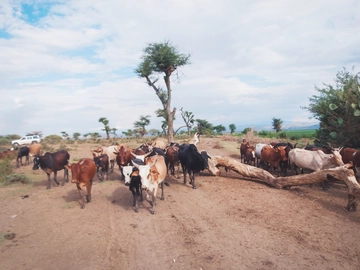Meat consumption and sustainability
April 05, 2023.
Globally, we produce around 350 million tons of meat each year - consuming 43 kg per person per year, on average. This is far too much and not sustainable according to a recent study by ZEF researchers. They took a comprehensive look at various sustainability dimensions, such as climate change, the environment, resource use, and human health, added by economic, social, and animal welfare aspects of meat consumption around the world. Major environmental pressures resulting from meat production are: Emissions of greenhouse gases and particulate matter, nutrient pollution, and acceleration of biodiversity loss. Moreover, overconsumption of meat can have negative impacts on human health.
Livestock: Not always an unsustainable option
But, livestock provide important sources of income and livelihoods and can function as safety nets for millions of people, especially in developing countries. And meat production can even be more resource-efficient than plant production, depending on the type of inputs used within meat production systems. Well-managed grazing of ruminants on grassland unsuitable for crop production can contribute to a food system sustainably feeding 10 billion people. In areas where sufficient micro- and macro nutrient intake from plants is difficult due to limited market access or seasonality effects, meat is an important contributor to healthy and nutritious diets.
Outlook and recommendations
Nevertheless, if we take a global perspective, we see that current levels of meat consumption are creating serious sustainability issues that threaten the functionality of several vital ecosystems. Meat consumption has been increasing substantially in the past decades. Spurred by population and income growth, low- and middle income countries have been catching up to the high levels of meat consumption that most wealthy nations have had for almost half a century.
The study concludes that meat consumption has to become more sustainable. Though technological progress to reduce externalities and increase the efficiency of meat production is an important element, meat consumption will have to be reduced too. This can be achieved by education and awareness-building measures as well as appropriate fiscal policies, added by promoting and developing healthy and nutritious plant-based substitutes.
Further reading: Parlasca, M. C., & Qaim, M. (2022). Meat Consumption and Sustainability. Annual Review of Resource Economics, 14. URL: https://doi.org/10.1146/annurev-resource-111820-032340
Author: Martin Parlasca is a senior researcher at ZEF.
Contact: parlasca(at)uni-bonn.de
This article was published in ZEF News No. 46.



